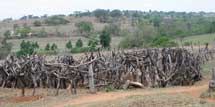 I distinctly remember watching Survivor: Africa in 2001 and realizing how vulnerable early man must have felt. The Survivor contestants were sleeping in a traditional african Kraal, which was simply a circular fence of thorny acacia bushes. At night, lions would circle the fence, roaring, growling and looking for an opening. With no claws or horns, thin skin and slow upright running, early hominids were incredibly vulnerable to predators when the drying climate cleared the forests and left man on the open savanna in ancient Africa.
I distinctly remember watching Survivor: Africa in 2001 and realizing how vulnerable early man must have felt. The Survivor contestants were sleeping in a traditional african Kraal, which was simply a circular fence of thorny acacia bushes. At night, lions would circle the fence, roaring, growling and looking for an opening. With no claws or horns, thin skin and slow upright running, early hominids were incredibly vulnerable to predators when the drying climate cleared the forests and left man on the open savanna in ancient Africa.
Yesterday, I looked at one reason that early homo may have evolved to run, which was covered in the Nature paper Endurance Running and the Evolution of Homo. That idea is that humans evolved to run down prey by running it to exhaustion, most prey animals being good at sprinting but not at endurance running.
Survivor: Africa brought to mind the other possible reason, which is summarized in the Nature paper:
Another hypothesis to explore is that ER (endurance running) was initially useful for effective scavenging in the open, semi-arid environments apparently inhabited by early Homo. If early hominids were regularly scaven- ging marrow, brain and other tissues from carcasses, then ER would have helped hominids to compete more effectively for these scattered and ephemeral resources.
 Picture this: early hominids have to sleep every night. They can’t climb in trees and jump from limb to limb to get away from predators, because the forests of Central Africa have disappeared. On the open savanna, they construct fences of thorn bushes (the traditional African kraal) to live in, journeying out to get food. If they spot vultures circling in the distance, they know there is a fresh kill that they can run to and beat hyenas or lions to the feast (or chase them off by throwing stones). The growth of the community is limited by how far groups of scavengers can run and return in one day, so humans evolve the ability to run fast (but not sprinting-fast) over long distances.
Picture this: early hominids have to sleep every night. They can’t climb in trees and jump from limb to limb to get away from predators, because the forests of Central Africa have disappeared. On the open savanna, they construct fences of thorn bushes (the traditional African kraal) to live in, journeying out to get food. If they spot vultures circling in the distance, they know there is a fresh kill that they can run to and beat hyenas or lions to the feast (or chase them off by throwing stones). The growth of the community is limited by how far groups of scavengers can run and return in one day, so humans evolve the ability to run fast (but not sprinting-fast) over long distances.
Humans may have evolved to run because we were the ultimate scavenger, not the ultimate hunter.
